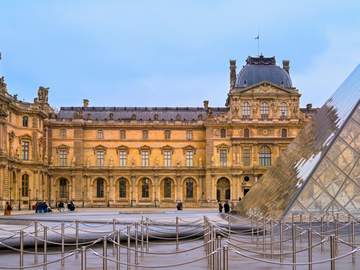
‘Heist’
Heist has been trending since one was carried out in Paris last weekend.
It took only a few minutes for thieves to execute a brazen daylight heist at the famed Louvre Museum in Paris on Sunday morning, coming away with jewels of “inestimable value” that had once belonged to Napoleon and his empresses.
—Rebecca Schneid, Time, 20 Oct. 2025
We define the noun heist as “armed robbery” as well as “theft.” As a noun, heist has only been in use since the early 1900s. Its earliest verb use in the mid 1800s was as a variant of hoist, meaning “to lift” or “to raise.” Hoist is a variant of the verb hoise which in turn represents an alteration of hysse, also meaning “to hoist.”
‘Brazen’
Brazen was also used in many articles about the heist, including the one cited above, resulting in high lookups for the word this week.
France’s Culture Minister gives fresh update on brazen Louvre heist
—(headline), The Independent (United Kingdom), 21 Oct. 2025
The lessons from the brazen heist at the Louvre
—(headline), The Economist, 21 Oct. 2025
Before Brazen Louvre Jewel Heist, There Were Lingering Security Concerns
—(headline), The New York Times, 21 Oct. 2025
We define the relevant sense of brazen as “marked by shameless or disrespectful boldness.” Its original sense, still in use today, is “made of brass.” Brazen traces back to the Old English word for brass, bræs.
‘Facade’
Lookups were high for facade as news and photos were published of demolition at the White House.
White House begins demolishing East Wing facade to build Trump’s ballroom
—(headline), The Washington Post, 20 Oct. 2025
We define the relevant sense of facade, sometimes styled façade, as “any face of a building given special architectural treatment.” Facade is also used for the front of a building or for “a false, superficial, or artificial appearance or effect.”
‘Protest’
More people than usual looked up protest this week, following No Kings protests held around the country last weekend.
Summerville’s “No Kings” protest on Oct. 18 drew nearly a thousand people to 500 N. Main St.—a rare sight for this community and a reflection of the deep political divisions shaping our nation. Yet beneath the noise of partisan rhetoric, Saturday’s gathering offered something fundamentally American: the right of citizens to assemble and make their voices heard peaceably.
—Editorial Board, The Post & Courier (Charleston, South Carolina), 22 Oct. 2025
On Saturday, between 5 and 7 million people assembled on streets, sidewalks and town squares across the country—in “red” states and in “blue”—to protest against President Trump and his administration, in what may have been the largest single-day demonstration in American history.
—Jamelle Bouie, The New York Times, 22 Oct. 2025
We define the relevant sense of the noun protest as “a usually organized public demonstration of disapproval” and the relevant sense of the verb as “to make a statement or gesture in objection to.” Both the noun and verb forms of protest trace back to the Latin verb protestari, which combines pro- (“forth”) with testari, meaning “to witness.”
Word Worth Knowing: ‘Hodiernal’
Hodiernal is an adjective not much in use in the hodiernal world; we define it in our Unabridged Dictionary as “of this day.” In a footnote to an 1883 collection of Ralph Waldo Emerson’s essays, the word is glossed as “belonging to the present day.” Hodiernal can be traced back to the Latin word hodiernus, which in turn comes from hodie, “today,” a contraction of hoc die, “this day.”
Literature is a point outside of our hodiernal circle, through which a new one may be described. The use of literature is to afford us a platform whence we may command a view of our present life, a purchase by which we may move it.
—Ralph Waldo Emerson, Essays, Lectures, and Orations, 1848




